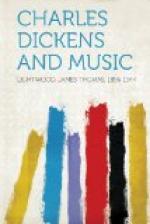a few fiddles in the window,
and some Pan’s pipes and
a tambourine, and a triangle,
and certain elongated
scraps of music.
It was to this shop that Bucket the detective came under the pretence of wanting a second-hand ‘wiolinceller’ (see p. 29). In the course of conversation it turns out that Master Bagnet (otherwise ‘Woolwich’) ‘plays the fife beautiful,’ and he performs some popular airs for the benefit of his audience. Mr. Bucket also claims to have played the fife himself when a boy, ‘not in a scientific way, but by ear.’
Bagpipes
Two references to the bagpipes deserve notice. One is in David Copperfield, where the novelist refers to his own early experiences as a shorthand reporter. He has no high opinion of the speeches he used to take down.
One joyful night, therefore, I noted down the music of the parliamentary bagpipes for the last time, and I have never heard it since; though I still recognize the old drone in the newspapers.
In O.M.F. (II.) we read of Charley Hexam’s fellow pupils keeping themselves awake
by maintaining a monotonous
droning noise, as if they
were performing, out of time
and tune, on a ruder sort
of bagpipe.
The peculiar subdued noise caused by a lot of children in a school is certainly suggestive of the instrument.
Trombone
Little is said about the trombone. We are told, in reference to the party at Dr. Strong’s (D.C.), that the good Doctor knew as much about playing cards as he did about ’playing the trombone.’ In ‘Our School’ (R.P.) we are told a good deal about the usher who ’made out the bills, mended the pens, and did all sorts of things.’
He was rather musical, and on some remote quarter-day had bought an old trombone; but a bit of it was lost, and it made the most extraordinary sounds when he sometimes tried to play it of an evening.
In a similarly dismembered state was the flute which Dickens once saw in a broker’s shop. It was ’complete with the exception of the middle joint.’
This naturally calls to mind the story of the choir librarian who was putting away the vocal parts of a certain funeral anthem. After searching in vain for two missing numbers he was obliged to label the parcel
‘His body is buried in peace.’ Two parts missing.
Organ
The references to the organ are both numerous and interesting, and it is pretty evident that this instrument had a great attraction for Dickens. The gentle Tom Pinch (M.C.), whom Gissing calls ’a gentleman who derives his patent of gentility direct from God Almighty,’ first claims our attention. He used to play the organ at the village church ‘for nothing.’ It was a simple instrument, ‘the sweetest little organ you ever heard,’ provided with wind by the action of the musician’s feet, and thus Tom was independent of a blower, though he was so beloved that




